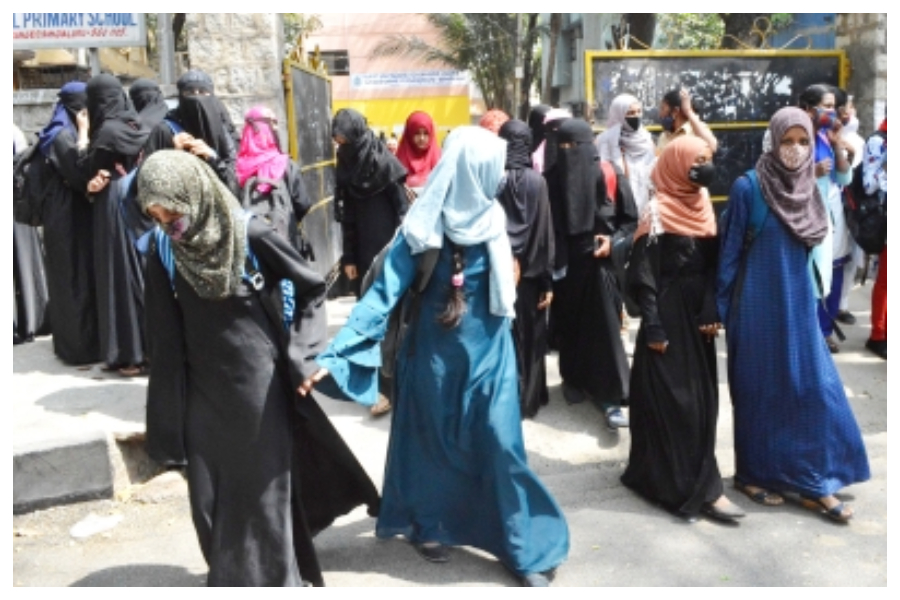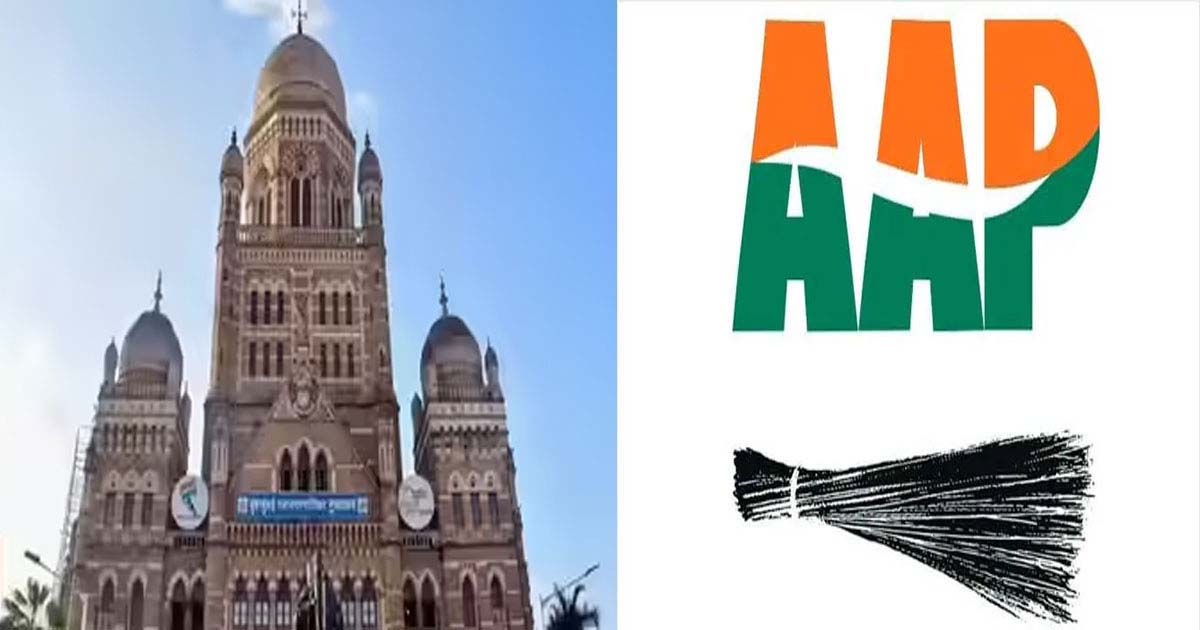Maharashtra
Wearing hijab not essential religious practice, K’taka AG to HC

Wearing hijab is not an essential religious practice in Islam and it can’t come under the Constitution’s Article 25 (Freedom of conscience and free profession, practice and propagation of religion), Advocate General Prabhuling Navadagi argued in the Karnataka High Court on Monday.
He said that petitioner students have approached the court not just seeking the permission to wear headscarves, but want to wear hijabs to attend classes as part of their religious right.
Contending that the petitioners can’t press for right to wear a hijab under Article 25, he said that the provision doesn’t state it as a fundamental right.
“It is impossible to define religion. Article 25 does not protects the practice of the religion but, which is essential religious practice, so they narrowed it to essential religious practices. In Sabarimala case also, they used the word ‘essential’,” he said.
The core religious practices, those things without which any religion is no religion, shall be considered as religious practices which could be considered under the right to religion, he said.
The practice which is prevented and feared to cause fundamental change in the character of religion is essential practice, he said, adding that essential practice is what causes a religion to vanish if the practice is not allowed.
Food and dress shouldn’t be considered as essential part, Navadagi said, and went on to quote Dr. B.R. Ambedkar’s statement of not allowing religion into the institutions and how it should be consciously kept out, which could be in the present context of religious symbols.
He also cited imposition of religion on others and noted when the Parliament discussed adoption of secularism, it was argued if is it necessary to have religious rights? The Parliament, at the time of throwing open of temples to all Hindus, stated that social reform must be brought to all religions.
The Advocate General maintained that the question of whether wearing of hijab is an essential religious practice must be settled and then other issues could be addressed. He reiterated that the petitioners simply would not come to the court with a request to permit them to wear headscarves, but seeking they be permitted to wear it as a religious practice.
At this, the bench questioned Navadagi as to what is the stand of the government on wearing of hijab, and if the government order is not specifying anything on hijab, what is the stand – can hijab can be permitted or not?
“If institutions are permitting students with hijab, will the government has any problem?” it asked.
The bench also asked the that the petitioners are seeking to wear same colour headscarf as the uniform, can be treated as part of the uniform? If they are wearing dupattas, can they wear it around their neck?
As he said that complete freedom is being given to the College Development Committees, and as a matter of principle, students are proposed to have secular outlook and can’t display religious symbols, the bench asked whether wearing of cloth around neck is religious?
He said that it is left to the discretion of the institutions, and they would find difficulties in matters of discipline.
Maharashtra
After Babri, it’s Kashi Mathura’s turn. Baba Bageshwar Dham’s provocation in Mumbai.

Mumbai: After the Babri Masjid, now it is Kashi Mathura’s turn, the slogan and provocation has been given by Dhirendra Shastri Bageshwar Dham Baba here in Mumbai. While answering the question of journalists in Andheri, Bageshwar Dham said that the temple is ours and we cannot give it up. When Baba was asked that the dispute had ended after the Babri Masjid, then why is the process of finding temples in mosques going on, to which he said that there are temples in many places and the dispute here is old. On Hindu Rashtra, Bageshwar Dham made it clear that there is also room for Muslims in Hindu Rashtra, his aim is to strengthen Sanatan, while a pilgrimage for Hindu Rashtra will start in Maharashtra to promote Hindutva. He said that it is wrong to declare India a secular country because India has never been secular. He said that there is a need for brotherhood and unity in this country and for that he goes on pilgrimage. Baba, while spewing venom, said that if efforts are not made for Hindu Rashtra and Hindus are not united, then the time is not far when the invasion of India will take place. He said that highly educated doctors in the country are becoming terrorists. If there is a Hindu Rashtra, then a Muslim youth will become Abdul Kalam. Will the mayor of Mumbai be a Muslim or a Hindu? On this, Bageshwar Dham said that he is away from politics, so a candidate should be selected who is useful for the people.
Maharashtra
AAP debut in BMC,will contest all 227 seats on it’s own, rules out allianceannounces

Mumbai: (Press release)The Aam Aadmi Party today announced its decision to contest the upcoming BMC General Elections 2026, on its own strength. The youngest national party, ruled out any possibility of an alliance and stated that they will field AAP candidates on all 227 wards.
“Despite being India’s ‘Urbs Prima’, Mumbai is in a mess. BMC has a whopping Rs. 74,447 Crore annual budget- the largest in Asia. Mumbaikars pay the highest taxes in the country and yet get shoddy public services.
The BMC is a cesspool of corruption and monumental ineptitude. BMC schools are shutting down and education quality remains poor, primary health care centres are non-existent, hospitals are overburdened and BEST is being systematically killed and it’s bus fleet has been starkly declining.Some of the world’s most expensive real estate is surrounded by squalor.
Garbage disposal is poor and filth is lying all around and our ecology has degraded with tree cover rapidly depleting. Pollution is at an all time high, Our AQI levels are as high as Delhi, despite us being on the coast and we are the only city in the world which releases untreated sewage in the open sea.
In the name of Dharavi Redevelopment, we are witnessing the biggest land grab in the history of independent India. For the last 4 years, the BMC has been without public representation and our once 90,000 Crore Fixed Deposits, have fallen sharply and reached its nadir.
All of this is nothing but ‘avoidable suffering’ inflicted on Mumbaikars, by a lumpen political class. Every political party has looted Mumbai, prioritising their selfish interests over public good. “, said Preeti Sharma Menon, Mumbai President, Aam Aadmi Party.
“The AAP is not just the alternative but the solution. Few good people in the BMC, is what Mumbai desperately needs. We know how to fix governance, under Arvind Kejriwal and Bhagwant Mann’s leadership, we have done so in Delhi and Punjab, provided world class education, healthcare, water and electricity, without corruption and without debt.
We need the broom, to sweep the corrupt and inept away. With just 7 corporators, AAP will have a house leader and representation on all statutory committees (Standing, Improvement, Health, Education and BEST). When we last contested in 2014 Lok Sabha polls, we got 5.16% of the vote share and over 2,73,000 votes. We will better this feat this time round and are getting tremendous support on the ground.
Mumbai needs AAP. We are India’s youngest National party and will contest on all of Mumbai’s 227 seats on our own strength.”, said Sanjay Singh, MP, Aam Aadmi Party.
Maharashtra
‘BMC Election Not A Family Business’: BJP Secretary Flags Nepotism Concerns Ahead Of Mumbai Civic Polls

Mumbai: Advocate Vivekanand Gupta, a secretary of the Bharatiya Janata Party’s Mumbai unit, has flagged concerns over alleged nepotism in ticket distribution ahead of the Brihanmumbai Municipal Corporation (BMC) elections, urging the party leadership to ensure that the civic polls do not turn into a ‘family business.’ The letter comes amid an internal unease that is brewing within the Bharatiya Janata Party (BJP) ahead of the high-stakes Brihanmumbai Municipal Corporation (BMC) elections.
In his letter, Gupta expressed strong reservations about the practice of issuing civic election tickets to family members of party office bearers, MLAs, and other public representatives. He pointed out that relatives such as wives, sons, daughters, and even grandchildren of influential leaders are often favoured during ticket distribution, sidelining grassroots workers who have served the party for years.
Gupta stressed that candidates for the BMC polls should be selected purely on merit and dedication, and not on the basis of family connections. He argued that the BJP, which prides itself on being a cadre-based organisation, must give priority to loyal karyakartas who have worked consistently at the ground level and contributed to the party’s growth in Mumbai.
The BJP leader also flagged concerns over the alleged misuse of changes in seat reservations. According to Gupta, when wards are converted from general seats to women, OBC, or other reserved categories, the opportunity is often used to accommodate family members of influential leaders rather than deserving party workers. He warned that such practices demoralise long-serving workers who patiently wait for a fair chance to contest elections.
Emphasising that the BJP has been built by the dedication and sacrifices of its workers, Gupta urged the party leadership to resist internal pressure while finalising candidates. He called for transparency, fairness, and a clear commitment to merit-based ticket allocation, adding that loyalty and hard work should be the sole criteria for contesting the civic polls.
Meanwhile, BJP Mumbai president Ameet Satam announced that the party will release its manifesto for the BMC elections in the first week of January 2026. However, it is yet to be decided whether the BJP will unveil a joint manifesto with its ally Shiv Sena. Voting for the much-anticipated BMC elections is scheduled to take place on January 15, with counting of votes slated for January 16.
-

 Crime3 years ago
Crime3 years agoClass 10 student jumps to death in Jaipur
-

 Maharashtra1 year ago
Maharashtra1 year agoMumbai Local Train Update: Central Railway’s New Timetable Comes Into Effect; Check Full List Of Revised Timings & Stations
-

 Maharashtra1 year ago
Maharashtra1 year agoMumbai To Go Toll-Free Tonight! Maharashtra Govt Announces Complete Toll Waiver For Light Motor Vehicles At All 5 Entry Points Of City
-

 Maharashtra1 year ago
Maharashtra1 year agoFalse photo of Imtiaz Jaleel’s rally, exposing the fooling conspiracy
-

 National News1 year ago
National News1 year agoMinistry of Railways rolls out Special Drive 4.0 with focus on digitisation, cleanliness, inclusiveness and grievance redressal
-

 Maharashtra1 year ago
Maharashtra1 year agoMaharashtra Elections 2024: Mumbai Metro & BEST Services Extended Till Midnight On Voting Day
-

 National News1 year ago
National News1 year agoJ&K: 4 Jawans Killed, 28 Injured After Bus Carrying BSF Personnel For Poll Duty Falls Into Gorge In Budgam; Terrifying Visuals Surface
-

 Crime1 year ago
Crime1 year agoBaba Siddique Murder: Mumbai Police Unable To Get Lawrence Bishnoi Custody Due To Home Ministry Order, Says Report












